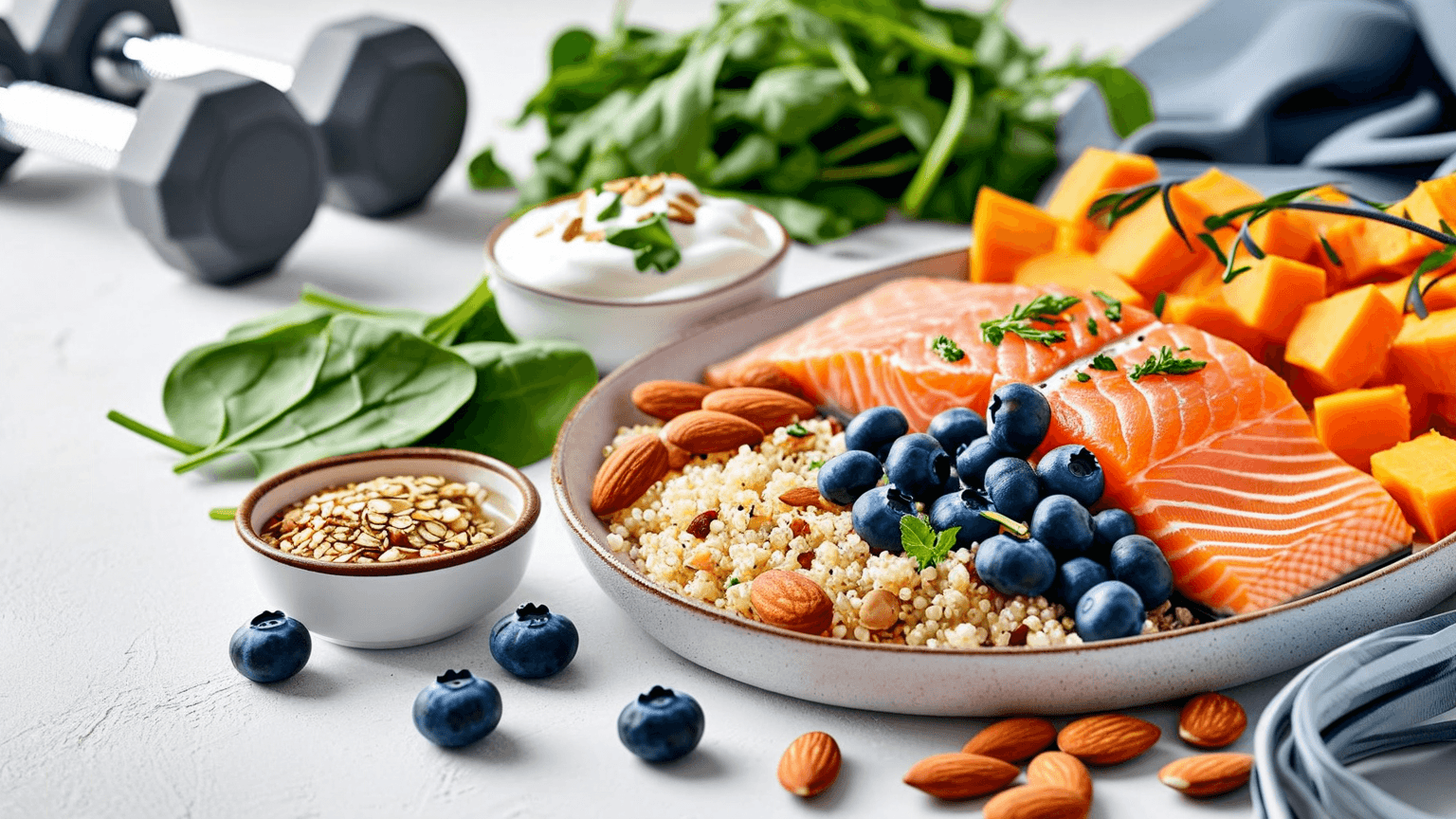Your brain consumes 20% of your daily energy, yet most people feed it the nutritional equivalent of junk food. While you meticulously plan your workouts and track your macros, your most important organ—the three-pound powerhouse controlling every thought, memory, and decision—runs on whatever scraps it can find.
The result? Mental fog that feels like thinking through molasses, afternoon energy crashes that derail productivity, and that frustrating tip-of-the-tongue sensation when you need your brain most. What if the solution isn't another cup of coffee or energy drink, but specific nutrients your brain desperately craves?
The Hidden Brain Nutrient Crisis Affecting 90% of Adults
Modern food processing strips away the very compounds your brain needs to function optimally. Research from the Journal of Nutritional Neuroscience reveals that even well-fed individuals show deficiencies in key cognitive nutrients. Your brain requires specific building blocks—omega-3 fatty acids, choline, B-vitamins, and specialized antioxidants—that simply aren't abundant in typical Western diets.
The problem compounds when you consider bioavailability. Many brain-boosting nutrients exist in foods, but in forms your body struggles to absorb. For instance, the omega-3 ALA found in flaxseeds converts to brain-usable DHA at less than 5% efficiency. Meanwhile, synthetic B-vitamins in fortified foods lack the cofactors needed for proper utilization.
This creates a perfect storm: your brain operates in survival mode, prioritizing basic functions over peak performance. Memory formation suffers, focus wavers, and that sharp mental edge you once took for granted becomes a distant memory. The solution lies in understanding exactly where to find these nutrients in their most bioavailable forms.
Omega-3 Powerhouses Beyond Fish Oil Supplements
While fish oil dominates the omega-3 conversation, the most potent brain-boosting sources often hide in plain sight. Wild-caught Alaskan salmon provides DHA in its natural phospholipid form, which crosses the blood-brain barrier 40% more effectively than standard triglyceride forms found in most supplements.
Grass-fed beef brain, though unconventional, contains the highest concentration of DHA available in any food source. Many specialty butchers and online retailers now offer brain from pasture-raised cattle, providing up to 2000mg of DHA per 100g serving. For those seeking plant-based options, algae oil supplements derived from Schizochytrium algae offer identical DHA molecules without the mercury concerns of fish sources.
Walnuts deserve special mention for their unique alpha-linolenic acid profile. While conversion to DHA remains limited, walnuts provide additional brain benefits through their vitamin E content and polyphenols. A Stanford University study found that consuming just 30g of walnuts daily improved cognitive flexibility within two weeks.
Pro tip: Combine plant-based omega-3 sources with a small amount of healthy fat to maximize absorption. Adding a tablespoon of MCT oil to your walnut-containing smoothie can increase omega-3 uptake by up to 60%.
Choline Rich Foods That Supercharge Memory Formation
Choline serves as the raw material for acetylcholine, your brain's primary learning and memory neurotransmitter. Yet 90% of Americans consume insufficient choline, creating a bottleneck in cognitive function that no amount of studying or mental effort can overcome.
Pasture-raised egg yolks reign supreme as nature's most concentrated choline source, providing 147mg per yolk in highly bioavailable phosphatidylcholine form. The key lies in sourcing: eggs from hens raised on pasture contain 38% more choline than conventional eggs, plus additional brain-supporting nutrients like lutein and zeaxanthin.
Beef liver, though polarizing, delivers an unmatched 356mg of choline per 100g serving alongside B-vitamins essential for neurotransmitter synthesis. Many health-focused butchers now offer liver from grass-fed cattle, which contains higher concentrations of fat-soluble vitamins. For those who can't stomach liver, desiccated liver capsules provide similar benefits without the taste.
Surprising plant sources include shiitake mushrooms and cruciferous vegetables like Brussels sprouts and broccoli. While lower in total choline content, these foods provide additional cognitive benefits through their unique phytochemical profiles. Shiitake mushrooms contain ergothioneine, a unique antioxidant that specifically protects brain cells from oxidative stress.
B-Vitamin Complexes That Fuel Mental Energy
B-vitamins function as a team, yet most people focus on individual vitamins rather than the synergistic complex your brain requires. The methylation cycle—crucial for neurotransmitter production and DNA repair—depends on specific B-vitamin forms that many supplements get wrong.
Nutritional yeast provides the most complete B-vitamin profile in naturally occurring ratios. Two tablespoons deliver therapeutic amounts of B1, B2, B6, and B12, plus folate in its natural form. Unlike synthetic vitamins, nutritional yeast contains cofactors and enzymes that enhance absorption and utilization.
Grass-fed organ meats offer B-vitamins in their most bioactive forms. Kidney provides massive amounts of B12 (up to 1000% daily value per serving), while heart delivers CoQ10 alongside B-vitamins for enhanced cellular energy production. Many online retailers now offer mixed organ meat blends that mask the strong flavors while preserving nutritional density.
For plant-based options, fermented foods like tempeh and miso provide B-vitamins produced by beneficial bacteria. The fermentation process creates methylated B-vitamin forms that bypass genetic variations affecting nutrient metabolism. Tempeh contains more B12 than most animal products, making it invaluable for vegetarian brain health protocols.
Antioxidant Compounds That Protect Cognitive Function
Your brain generates more oxidative stress than any other organ, making targeted antioxidant protection crucial for maintaining mental sharpness. However, not all antioxidants cross the blood-brain barrier effectively, making source selection critical.
Blueberries contain anthocyanins that specifically accumulate in brain regions associated with memory and learning. Wild blueberries provide higher antioxidant concentrations than cultivated varieties, with frozen wild blueberries often more potent than fresh due to cellular breakdown during freezing that increases bioavailability.
Dark chocolate with 85% cacao or higher delivers flavonoids that increase blood flow to the brain within two hours of consumption. The key lies in processing: raw cacao powder provides higher flavonoid concentrations than processed chocolate bars. Combine cacao with a small amount of black pepper to increase absorption through piperine's bioenhancing effects.
Green tea provides L-theanine alongside EGCG, creating a unique combination that promotes calm focus while protecting neurons from damage. Matcha powder offers the highest concentration of these compounds, providing up to 137 times more antioxidants than regular green tea. Quality matters significantly—ceremonial grade matcha contains higher L-theanine levels than culinary grades.
Specialized Nootropic Compounds in Everyday Foods
Beyond basic nutrients, certain foods contain unique compounds that directly enhance cognitive performance. These natural nootropics often work through mechanisms that synthetic alternatives can't replicate, providing sustainable brain enhancement without side effects.
Lion's mane mushrooms contain hericenones and erinacines, compounds that stimulate nerve growth factor production. Fresh lion's mane provides the highest concentrations, though quality dried powders retain significant activity. Many farmers markets now carry fresh lion's mane, or you can grow your own using readily available growing kits.
Turmeric's curcumin crosses the blood-brain barrier when combined with piperine from black pepper, reducing neuroinflammation while supporting new brain cell formation. The most bioavailable form comes from fresh turmeric root combined with freshly ground black pepper and a fat source like coconut oil. This combination increases curcumin absorption by up to 2000%.
Bacopa monnieri, while typically found in supplement form, grows easily as an aquatic plant that can be consumed fresh. Traditional Ayurvedic preparations involve consuming fresh bacopa leaves with ghee, providing bacosides in their natural matrix alongside supporting compounds that enhance absorption and reduce potential side effects.
Sourcing Strategies for Maximum Potency and Purity
Where you source brain-boosting nutrients matters as much as what you choose. Processing methods, storage conditions, and harvesting practices dramatically affect potency and bioavailability. Understanding these factors helps you maximize your investment in cognitive nutrition.
For supplements, third-party testing becomes crucial. Look for companies that provide certificates of analysis showing heavy metal content, microbial contamination, and active compound concentrations. Nordic Naturals for omega-3s, Thorne for B-vitamins, and Four Sigmatic for mushroom compounds consistently demonstrate superior quality control.
Local sourcing often provides fresher, more potent options for whole foods. Farmers markets offer direct access to growers who can explain harvesting and storage methods. Many small farms now specialize in nutrient-dense varieties—purple carrots with higher anthocyanin content, or heritage tomatoes with elevated lycopene levels.
Online specialty retailers fill gaps for hard-to-find items like grass-fed organ meats, wild-caught fish, and exotic mushrooms. Companies like Ancestral Supplements, Vital Choice, and Mountain Rose Herbs maintain cold-chain shipping and proper storage to preserve nutrient integrity during transport.
Timing and Combination Strategies for Enhanced Absorption
When and how you consume brain nutrients significantly impacts their effectiveness. Understanding absorption windows, food combinations, and timing relative to meals can double or triple the cognitive benefits you receive from the same nutrients.
Fat-soluble nutrients like omega-3s and curcumin require dietary fat for absorption. Consuming these with MCT oil, avocado, or nuts increases bioavailability while providing additional brain benefits. MCT oil specifically provides ketones that serve as alternative brain fuel, creating synergistic effects with other cognitive nutrients.
B-vitamins absorb best on an empty stomach but can cause nausea in sensitive individuals. Taking B-complex with a small amount of food—like a handful of nuts—provides enough buffering without significantly impacting absorption. Avoid taking B-vitamins late in the day, as they can interfere with sleep quality in some people.
Choline works synergistically with omega-3s for optimal brain cell membrane function. Consuming eggs (high in choline) with salmon (high in omega-3s) creates a powerful combination for memory enhancement. This explains why traditional brain-healthy cuisines often combine these foods naturally.
Common Sourcing Mistakes That Waste Money and Reduce Benefits
Even well-intentioned brain health enthusiasts make costly mistakes when sourcing cognitive nutrients. These errors not only waste money but can actually impede the mental performance improvements you're seeking.
Buying synthetic vitamins instead of whole food sources represents the most common error. Synthetic B12 as cyanocobalamin requires your body to remove a cyanide molecule before use, creating unnecessary metabolic burden. Methylcobalamin or adenosylcobalamin forms provide immediate benefits without detoxification requirements.
Choosing the cheapest omega-3 supplements often means getting rancid oils that promote inflammation rather than reducing it. Fresh fish oil should have minimal fishy odor and taste. If your omega-3 supplement causes fishy burps or has a strong smell, it's likely oxidized and potentially harmful.
Ignoring bioavailability leads to poor results despite good intentions. Consuming turmeric without black pepper, taking iron with coffee, or eating calcium-rich foods with magnesium supplements all reduce absorption of key nutrients. Understanding these interactions helps you maximize every dollar spent on brain nutrition.
Storage mistakes destroy nutrients before you consume them. Omega-3 supplements degrade rapidly when exposed to heat, light, or air. Storing fish oil in the refrigerator and buying smaller bottles more frequently preserves potency better than bulk purchasing that sits in your pantry for months.
Building Your Personal Brain Nutrition Sourcing Plan
Creating a sustainable approach to brain nutrition requires balancing optimal sourcing with practical considerations like budget, availability, and personal preferences. The goal is consistency over perfection—regular consumption of good sources beats sporadic use of perfect ones.
Start with a foundation of easily accessible, nutrient-dense whole foods. Eggs, walnuts, blueberries, and dark leafy greens provide broad-spectrum brain support and are available year-round in most locations. Build your daily routine around these staples before adding specialized supplements or exotic foods.
Identify your biggest nutrient gaps through symptoms and lifestyle factors. Vegetarians need special attention to B12 and choline, while people with high stress levels require extra B-vitamins and magnesium. Those with inflammatory conditions benefit most from omega-3s and antioxidant-rich foods.
Create backup options for consistency. If fresh wild salmon isn't always available, keep high-quality canned salmon or omega-3 supplements on hand. Having multiple sources for key nutrients prevents gaps that can derail your cognitive enhancement efforts.
Your brain's performance directly reflects the quality of fuel you provide it. By understanding where to find the most potent, bioavailable forms of cognitive nutrients, you can transform mental fog into laser focus, forgetfulness into sharp memory, and mental fatigue into sustained cognitive energy. The key lies not just in what you consume, but in sourcing these nutrients from the right places, in the right forms, at the right times.
Start with one or two high-impact changes—perhaps switching to pasture-raised eggs for choline or adding wild blueberries for antioxidants. As these become habits, gradually expand your brain nutrition toolkit with additional sources and combinations. Your mind will thank you with improved clarity, enhanced memory, and the mental energy to tackle whatever challenges come your way.
Related Topics
Explore more superfood insights and nutrition guidance.



